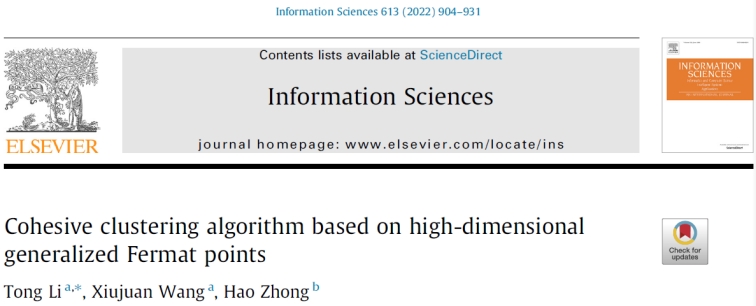Li Tong's research group has made new progress in the field of high-dimensional data clustering algorithms
publish date: March 27, 2023 clicks:
Professor Li Tong's research group from the School of Business and the School of Intellectual Property published a research result titled "Cohesive clustering algorithm based on high dimensionally generalized Fermat points" in the international journal Information Sciences (JCR Zone 1, IF8.233, Top Journal of Computer Science).

In response to the lack of optimal clustering centers in current clustering theory, the research group has extended the theory of optimal set nodes (Fermat points) in number theory to higher dimensions for the first time, strictly standardizing the theoretical expression of "minimizing intra class differences" in clustering centers, and proposing a cohesive clustering algorithm called FL algorithm with Fermat points as clustering centers. Unlike the intelligent algorithm design frameworks commonly used internationally, such as swarm intelligence, neural networks, and evolutionary algorithms, the FL algorithm takes the plant phototropism mechanism as its algorithm origin and is an intelligent algorithm for high-dimensional data clustering analysis. The research of the research group has proven that the optimal selection of clustering center points plays a crucial role in the final results of high-dimensional data clustering. The theory presented in this article provides new theoretical basis and algorithmic support for pattern recognition of high-dimensional data with complex structures.
The Plant Growth Simulation Algorithm (PGSA), which implements the FL algorithm, is an original intelligent algorithm proposed by Professor Li Tong with the support of two general projects funded by the National Natural Science Foundation of China. Because PGSA's "parameterless" design for the first time avoided the problem of parameter setting existing in other intelligent algorithms, it was used by scholars from more than ten countries, including the United States, Russia, Italy, Ireland, South Korea, Japan, Türkiye, India, to solve various optimization problems in artificial intelligence, logistics, electricity, water conservancy, military, computer, finance, nuclear industry, machinery, construction, medical and other fields. At the same time, hundreds of scholars from more than 50 universities in China, including Shanghai Jiao Tong University, Tongji University, South China University of Technology, Beijing Jiao Tong University, Sun Yat sen University, Dalian University of Technology, Nanjing University, Xiamen University, Harbin Institute of Technology, Suzhou University, Dalian Maritime University, Shanghai University of Technology, and Jiangnan University, have used PGSA to solve practical problems in various fields. After 20 years of continuous development, PGSA has formed a type of intelligent algorithm system with "no parameters" characteristics, and has gained a good academic reputation both domestically and internationally.



